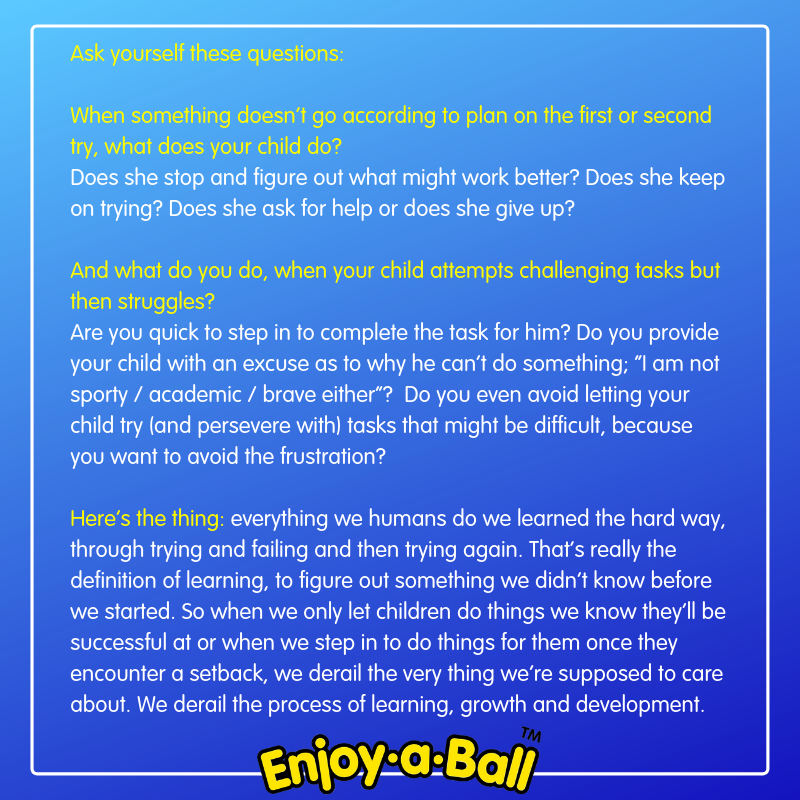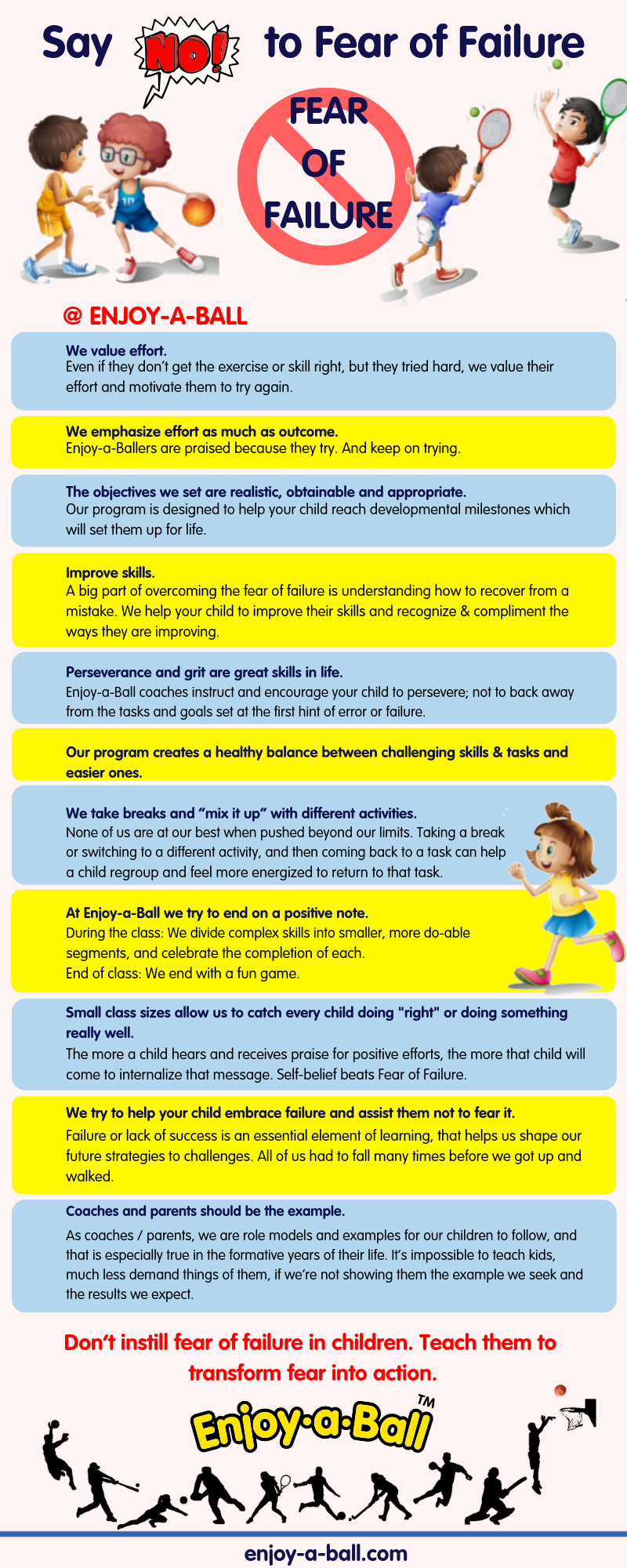Don’t fear failure.
I received a phone call this morning and it went something like this:
ME: “Enjoy-a-Ball. How can I help you?”
PARENT: “My daughter has decided that she no longer wants to do Enjoy-a-Ball, so I need to cancel my subscription.”
ME: “May I ask why your daughter doesn’t want to continue with her class?”
PARENT: “She says she doesn’t want to go and I don’t think she enjoys it any more. I am tired of trying to make her go.”
ME: “Yes, sometimes it is just a case of a child not enjoying the class anymore, but maybe establish that first by chatting with your Enjoy-a-Ball coach to see if there are some other factors at play.”
I proceeded to explain that as our kids grow up and go through the various stages of life, learning new things (which, as we all know, can be difficult) their go-to reaction will quite often be resistance, avoidance, distraction, negotiation or a full-blown meltdown. Some of these reactions are the result of kids being overwhelmed by their emotions – I can’t do this | I don’t know anybody | Nobody likes me | This is too difficult. And some are what they’ve learned works to successfully delay or avoid the thing that is making them feel anxious, afraid, unhappy, stressed etc.

According to the NHS children tend to feel anxious about different things at different ages. Many of these worries and fears are a normal part of growing up.
From about eight months to three years, for example, it’s very common for young children to have something called separation anxiety. They may become clingy and cry when separated from their parents or carers. This is a normal stage in children’s development and tends to ease off at around age two to three.
It’s also common for pre-school children to develop specific fears or phobias. Common fears in early childhood include animals, insects, storms, heights, water, blood, and the dark. These fears usually go away gradually on their own.
Throughout a child’s life there will be other times when they feel anxious.
As a coach, I’ve noticed one factor that consistently holds children back: fear of failure.
In a class situation it is not necessarily the first day that triggers this reaction, it can be from a child who has attended for a year who is facing a more advanced sport specific skill, which needs more practice.
When kids are afraid to fail, they typically respond to challenges in one of two ways:
1. They give up before they even begin, preferring to avoid the possibility of failure.
2. They get upset and down on themselves when they don’t get something right the first time, resulting in anxiety, poor performance and giving up.
Fear is a common response to new challenges or experiences. These situations make children feel uncertain, vulnerable, powerless, and anxious. They strip away a child’s sense of security and control. As a result, many children avoid the unfamiliar. They prefer NOT to risk attempting something new, leading to missed opportunities and setting a negative pattern that can persist into adult life.

Here are some strategies and activities we use to help children tackle new situations, skills, or obstacles with confidence. (And they are very easy for you to use as well.)
We value effort. Even if they don’t get the exercise or skill right, but they tried hard, we value their effort and motivate them to try again.
We emphasize effort as much as outcome. Enjoy-a-Ballers are praised because they try. And keep on trying. This helps to lay a foundation for your child to develop a self-appraisal that is defined in terms of effort and willingness as much as in the end result.
The objectives we set are realistic, obtainable and appropriate.
Enjoy-a-Ballers are encouraged to achieve sensible and attainable objectives, that are within their reach and that can be measured. Our programme is designed to help your child reach developmental milestones which will set them up for life.
Improve skills. A big part of overcoming the fear of failure is understanding how to recover from a mistake. We help your child to improve their skills and recognize & compliment the ways they are improving.
Perseverance and grit are great skills in life. Enjoy-a-Ball coaches instruct and encourage your child to persevere; not to back away from the tasks and goals set at the first hint of error or failure. It’s important to note that we (coaches and parents / carers) must be realistic in our expectations; however, it’s also important to insist that effort can bring great results and valuable experiences.
Our programme creates a healthy balance between challenging skills & tasks and easier ones.
We take breaks and “mix it up” with different activities.
None of us are at our best when pushed beyond our limits. Taking a break / switching to a different activity, and then coming back to a task can help a child regroup and feel more energized to return to that task.
At Enjoy-a-Ball we try to end on a positive note.
During the class: We divide complex skills into smaller, more do-able segments, and celebrate the completion of each.
End of class: We end with a fun game.
Small class sizes allow us to catch every child doing something really well. The more a child hears and receives praise for positive efforts, the more that child will come to internalize that message. The expectation is that this will contribute to an increased willingness to keep trying.
We try to help your child to embrace failure and assist them not to fear it. Failure or lack of success is an essential element of learning that helps us shape our future strategies to challenges. All of us had to fall many times before we learned to walk.
Coaches and parents should be the example. Adult (and in particular, a parents’) influence is of great importance. As coaches / parents, we are role models and examples for our children to follow, and that is especially true in the formative years of their life. It’s impossible to teach kids, much less demand things of them, if we’re not showing them the example we seek and the results we expect.
No comments yet